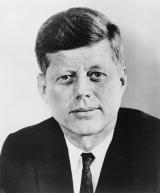Chi uscì con Angie Dickinson?
John Fitzgerald Kennedy ha datato Angie Dickinson dal ? al ?. La differenza di età era di 14 anni, 4 mesi e 1 giorni.
Frank Sinatra ha datato Angie Dickinson dal ? al ?. La differenza di età era di 15 anni, 9 mesi e 18 giorni.
Angie Dickinson

Angie Dickinson, nata Angeline Brown (Kulm, 30 settembre 1931), è un'attrice statunitense.
È principalmente nota per il ruolo di Suzanne "Pepper" Anderson nel telefilm poliziesco Pepper Anderson - Agente speciale, andato in onda dal 1974 al 1978 sulla rete televisiva NBC.
Per saperne di più...John Fitzgerald Kennedy

John Fitzgerald Kennedy, detto Jack o JFK (Brookline, 29 maggio 1917 – Dallas, 22 novembre 1963), è stato un politico statunitense, 35º presidente degli Stati Uniti d'America dal 1961 al 1963.
Nato nella influente famiglia Kennedy, cattolica di origine irlandese, si laureò all'università Harvard nel 1937. Allo scoppio della seconda guerra mondiale si arruolò, comportandosi valorosamente nel Pacifico e venendo insignito della Navy and Marine Corps Medal. Finito il conflitto aderì al Partito Democratico, si candidò nel 1946 alla Camera dei rappresentanti, nella quale ottenne un seggio, e nel 1952 al Senato, risultando nuovamente eletto.
Nel 1960 assunse la leadership del partito e si candidò alla presidenza, scegliendo Lyndon B. Johnson come candidato alla vicepresidenza. Nelle elezioni dell'8 novembre sconfisse il vicepresidente uscente Richard Nixon e s'insediò alla Casa Bianca il 20 gennaio dell'anno successivo. Fu il primo cattolico a diventare presidente.
La sua breve presidenza, in epoca di guerra fredda, fu segnata da alcuni eventi molto rilevanti: lo sbarco nella Baia dei Porci, la Crisi dei missili di Cuba, la costruzione del Muro di Berlino, la corsa allo spazio, gli antefatti della Guerra del Vietnam e l'affermarsi del Movimento per i diritti civili degli afroamericani.
Kennedy fu assassinato il 22 novembre del 1963 a Dallas, in Texas. Lee Harvey Oswald, un ex marine di supposte simpatie marxiste, fu arrestato poco dopo il fatto e accusato dell'omicidio, ma venne a sua volta ucciso due giorni dopo da Jack Ruby, prima di poter essere processato. L'FBI e la Commissione Warren conclusero che Oswald aveva agito da solo. Nel corso degli anni successivi numerosi interrogativi furono sollevati sulla dinamica dell'attentato e sulla reale identità dell'autore; nel 1979 la United States House Select Committee on Assassinations pubblicò un rapporto nel quale si concluse che l'atto di Oswald fu probabilmente frutto di una cospirazione.
Per saperne di più...Angie Dickinson

Frank Sinatra

Frank Sinatra, pseudonimo di Francis Albert Sinatra (Hoboken, 12 dicembre 1915 – Los Angeles, 14 maggio 1998), è stato un cantante e attore statunitense.
Prima grande celebrità nella storia della musica popolare, Sinatra viene considerato da molti critici musicali uno dei maggiori cantanti del XX secolo.
Egli è noto in Italia soprattutto come The Voice, mentre negli Stati Uniti d'America e in altri paesi era conosciuto anche con soprannomi come Ol' Blue Eyes, Frankie, Swoonatra e molti altri. Fu un personaggio importante e carismatico dell'intrattenimento statunitense e internazionale, riuscendo a imporsi nel panorama musicale dal periodo della grande depressione americana fino ai giorni nostri, grazie a un'intensa attività discografica e concertistica durata oltre sessant’anni, dai primi anni trenta fino al 1995, anno in cui tenne il suo ultimo concerto dal vivo.
Egli era, assieme ad artisti come Pat Boone, Dean Martin e Tony Bennett, uno dei maggiori esponenti di uno stile canoro raffinato ed elegante, in seguito definito crooning.
Con circa 150 milioni di dischi venduti è uno degli artisti musicali di maggior successo discografico. Nella sua longeva carriera si è aggiudicato complessivamente tre premi Oscar (un Oscar onorario nel 1946, un Oscar al miglior attore non protagonista nel 1954 ed il premio speciale umanitario Jean Hersholt nel 1971). Ha inoltre ricevuto due Golden Globe, undici Grammy Awards, uno Screen Actors Guild Award alla carriera nel 1972 ed il Kennedy Center Honors nel 1983.
Nel 1985 ricevette dal presidente Ronald Reagan la Medaglia presidenziale della libertà e nel 1997 gli Stati Uniti lo onorarono con la Medaglia d'oro del Congresso, la più alta onorificenza assegnata dagli USA.
Oltre 2 200 brani e più di 60 album di canzoni inedite pubblicati, ne fanno uno dei cantanti con la maggior produzione discografica nella storia della musica.
Per saperne di più...